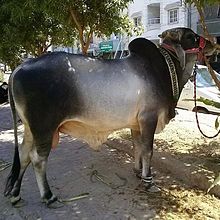 | |
| Conservation status | |
|---|---|
| Other names |
|
| Country of origin | Pakistan |
| Use |
|
| Traits | |
| Weight |
|
| Height |
|
| |
The Dajal or Dajjal is a Pakistani breed of large draught cattle. It originates in Dera Ghazi Khan District of Punjab Province in central-eastern Pakistan, and is named for the town of Dajal in that district. It derives from the Bhagnari, but is not so large.
History
From the middle of the nineteenth century cattle of the Bhagnari breed were used to improve the local cattle of Dera Ghazi Khan District of Punjab Province in central-eastern Pakistan, leading to the creation of the Dajal breed, which is similar to the Bhagnari, but is not so large. In the early twentieth century it was the only draught breed of any significance in the western Punjab Province. In the 1940s there were over a million head of the Dajal, considerably more than there were Bhagnari; by 1986 that number had dropped to below 72000.
The Dajal, like the Cholistani, was not included in the 1996 census of cattle in Pakistan, apparently because there were at that time no purebred examples in any government breeding station. In 2007 its conservation status was listed by the FAO as 'not at risk'. No population data has been reported to DAD-IS since 1986, and in 2023 its conservation status was shown as 'unknown'.
Characteristics
The Dajal is morphologically similar to the Bhagnari from which it derives, but is not so large. Genetically it is closest to the Rohjan, which has a similar area of distribution.
Use
The Dajal is a draught breed. The annual milk yield is variously reported to be approximately 750 kg or 900 kg in a lactation of 257 days, or 1000 kg in a lactation of undefined length; a statistical study published in 2022 found a median yield of 826 kg and median lactation length of 203 days.
Cross-breeding with Charolais stock produces a fast-growing beef calf.
References
- ^ Barbara Rischkowsky, Dafydd Pilling (editors) (2007). List of breeds documented in the Global Databank for Animal Genetic Resources, annex to The State of the World's Animal Genetic Resources for Food and Agriculture. Rome: Commission on Genetic Resources for Food and Agriculture, Food and Agriculture Organization of the United Nations. ISBN 9789251057629. Archived 23 June 2020.
- ^ Breed data sheet: Dajal / Pakistan (Cattle). Domestic Animal Diversity Information System of the Food and Agriculture Organization of the United Nations. Accessed May 2023.
- Marleen Felius (1995). Cattle Breeds: An Encyclopedia. Doetinchem, Netherlands: Misset. ISBN 9789054390176.
- ^ Valerie Porter, Ian Lauder Mason (2002). Mason's World Dictionary of Livestock Breeds, Types, and Varieties (fifth edition). Wallingford: CABI. ISBN 085199430X.
- (1910). Cattle and Dairying in the Punjab. Lahore: Printed at the "Civil and Military Gazette" press, by S. T. Weston.
- ^ Valerie Porter, Lawrence Alderson, Stephen J.G. Hall, D. Phillip Sponenberg (2016). Mason's World Encyclopedia of Livestock Breeds and Breeding (sixth edition). Wallingford: CABI. ISBN 9781780647944.
- (March 2003). Country Report on State of Animal Genetic Resources of Pakistan. Annex to: Barbara Rischkowsky, Dafydd Pilling (editors) (2007). The State of the World's Animal Genetic Resources for Food and Agriculture. Rome: Commission on Genetic Resources for Food and Agriculture, Food and Agriculture Organization of the United Nations. ISBN 9789251057629. Archived 10 January 2017.
- ^ Cattle. Lahore: University of Veterinary & Animal Sciences. Accessed May 2023
- Consultative Group on International Agricultural Research Learning Resource Center (). Dajal. Los Baños, Laguna, Philippines: International Rice Research Institute. Accessed May 2023.
- Matthijs Kool, Frank van Steenbergen (editors) (January 2014). Livestock Breeds in Spate Irrigation. Spate Irrigation Network, Practical Note #24. Accessed May 2023.
- M. Sajjad Khan, Z. Rehman, Muqarrab A. Khan, Sohail Ahmad (2008). Genetic resources and diversity in Pakistani cattle. Pakistan Veterinary Journal. 28 (2): 95–102.
- M. Afzal, A. N. Naqvi (2004). Livestock resources of Pakistan: present status and future trends. Quarterly Science Vision. 9 (1): 1–14.
- Hafiz Muhammad Adeel Farooq, Huma Rizwana, Atique Ahmed Behan, Ghulam Shabir Barham, Muhammad Bilawal Arain, Muhammad Sohaib (2022). Performance Analysis of Dajal Cattle Under Semi Intensive System at Rajanpur. University of Sindh Journal of Animal Sciences. 6 (2): 8–18.
- Asim Faraz, Abdul Waheed (December 2018). Dajal – a cattle breed of Pakistan. Farmer Reformer. Faisalabad: Society of Crop & Animal Production. ISSN 2519-7835. 3 (12): 2–3.
Further reading
- Hamid Mustafa, Waqas Ahmad Khan, Zulfiqar Hussain Kuthu, Kim Eui-soo, Adeela Ajmal1, Khalid Javed1, Talat Naseer Pasha, Afzal Ali1, Muhammad Tariq Javed, Tad S. Sonstegard (2018). Genome-Wide Survey of Selection Signatures in Pakistani Cattle Breeds. Pakistan Veterinary Journal. 38 (2): 214–218. doi:10.29261/pakvetj/2018.051.
| Cattle breeds of Pakistan | |
|---|---|
| These are the cattle breeds considered in Pakistan to be wholly or partly of Pakistani origin. Inclusion here does not necessarily imply that a breed is predominantly or exclusively Pakistani. | |